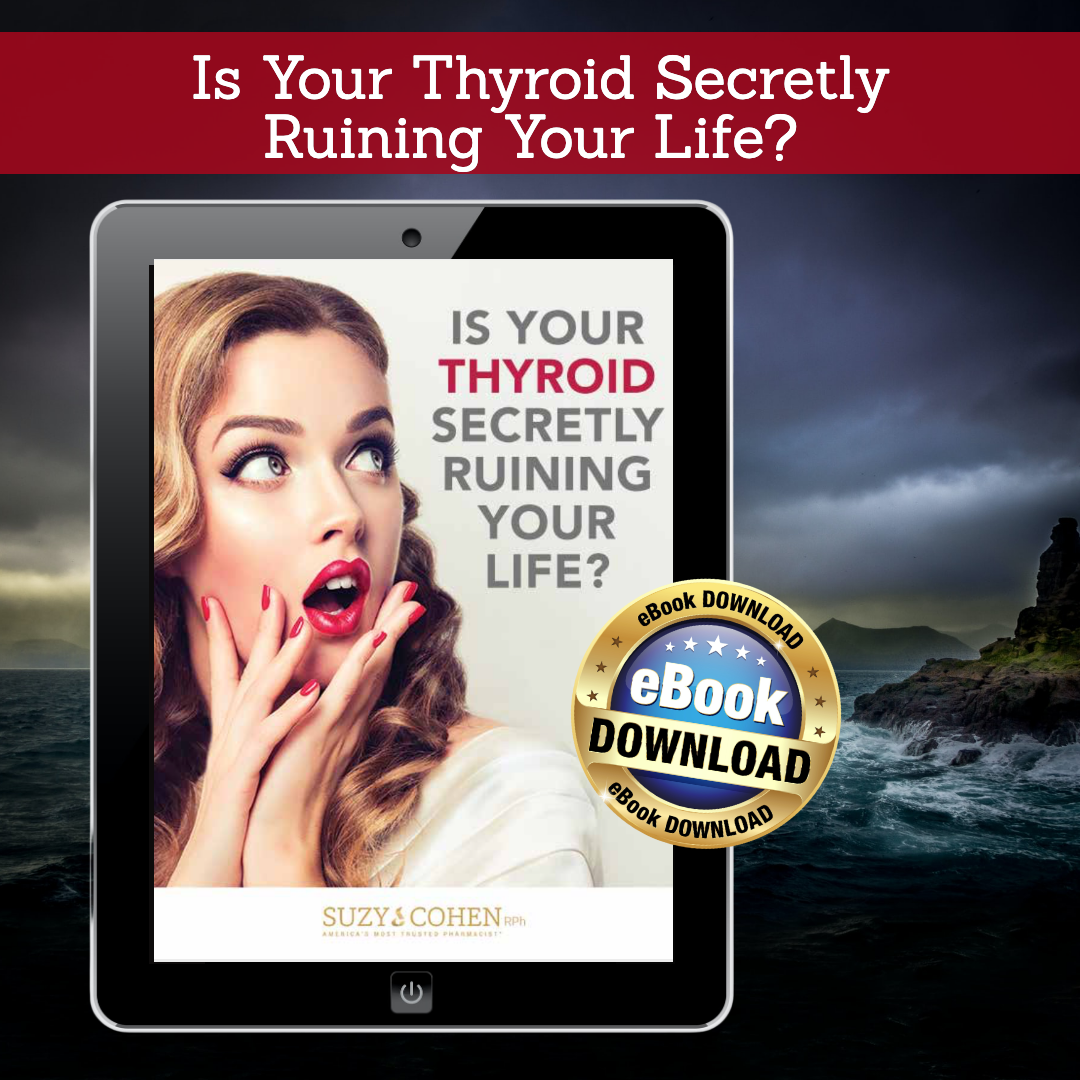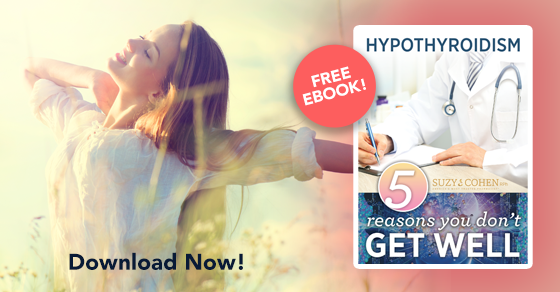What's On This Page?
ToggleIf you have hypothyroidism, it can cause depression or anxiety, or OCD (Obsessive Compulsive Disorder). The medications used to treat psychiatric disorders work temporarily at best, if at all because they don’t address the low thyroid hormone. It may be subclinical too, meaning the labs appear almost as if they are normal. This is the trouble people get into when treating symptoms (ie anxiety) instead of the root cause (ie hypothyroidism in my example).
For a moment, let’s talk about “anxiety” because it is frequently misdiagnosed or dismissed as stress.
Anxiety can have many definitions and physical symptoms. For some people, it could appear as looping thoughts, racing heart or fast, unwanted thoughts, trembling, and the sensation of internal tremors. For others, it might just be a feeling of nervousness or having unsubstantiated phobias, earworms, or constant worry.
So as you can see, anxiety alone can encompass a lot of symptoms and be overlooked by a parent. If your teenager has any of these symptoms, the underpinning cause may very well be thyroid disease, either high or low.
If you have depression or anxiety, then failing to normalize low thyroid hormone levels will make it harder, if not impossible for you to feel normal.
Psychiatric disorders and thyroid/hypothyroidism disease:
There’s a very strong correlation between psychiatric disorders and thyroid disease. This fact shocks most people suffering from either condition because the correlation is not discussed very often, and many good doctors overlook the connection because their practice is ONE thing, it has a singular focus as in endocrinology… or psychiatry, but not both. They need to understand a little bit about both branches of medicine to really get how intricately these two disorders are tied, and some doctors do, but not all.
Endocrinologists almost always prescribe Levothyroxine to try people on as their first thyroid medication. The response will not be that good… but it’s rather popular. Some very good clinical research shows it is not ‘the fix’ for people with hypothyroidism who ALSO have chronic stress, hormone imbalances, depression, OCD, or anxiety.
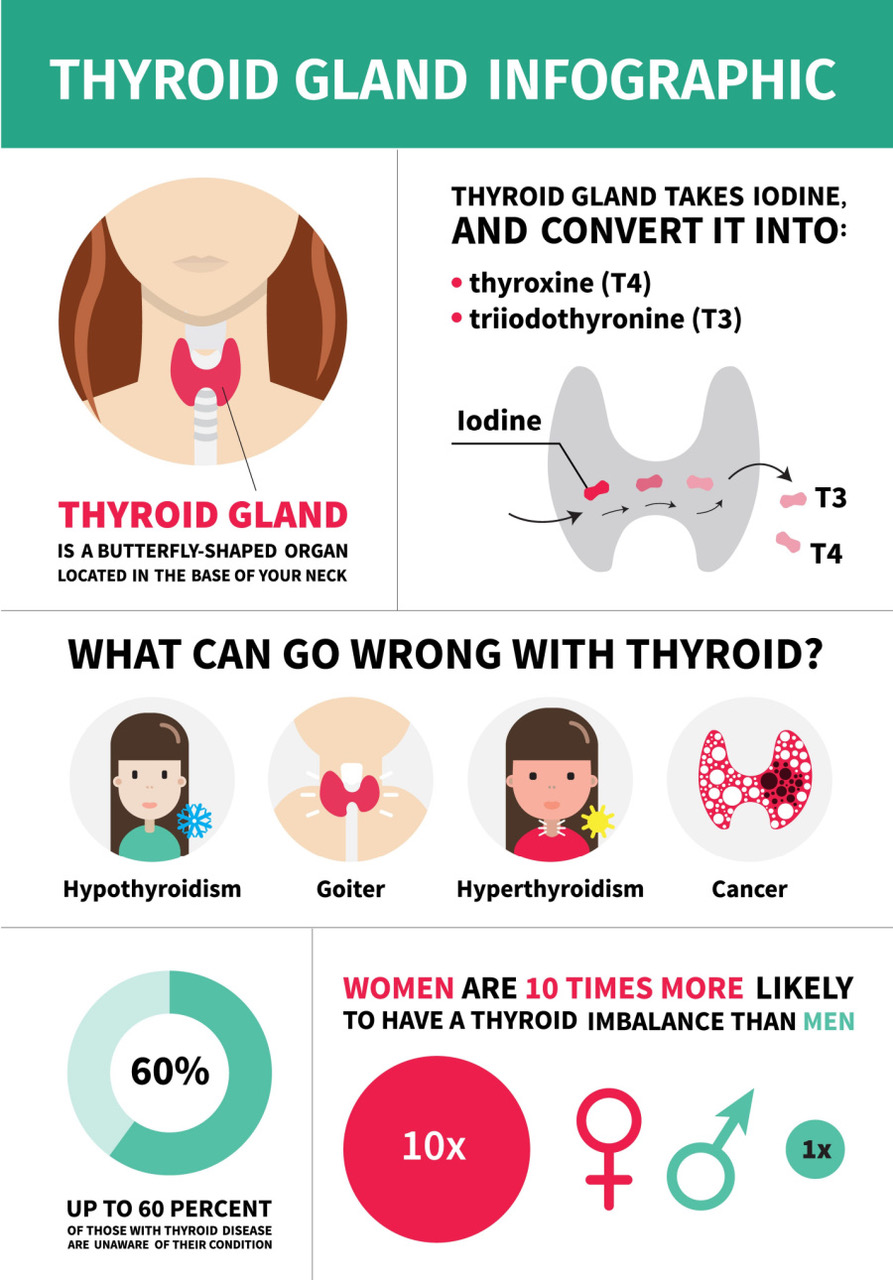
Many natural practitioners suggest a popular mineral, MAGNESIUM which participates in some ‘calming’ pathways in your body.*
I’m sure many of you will agree with me on that. If you have ever taken Levothyroxine (aka Levoxyl, Synthroid, and others), and you didn’t feel like it breathed life into you, then you will agree. Nevertheless, levothyroxine and similar T4 drugs are prescribed very commonly, as is the brand name Synthroid.
These drugs are bio-identical T4 hormones, but this is the issue. The T4 has to be converted to T3 to get inside your cells and actually do the work of burning off your weight, making you thin, happy, energetic, and strong. If the T4 doesn’t convert to T3, pretty much nothing happens in this regard.
Only T3 is biologically active. The argument could be made that you will convert the Levothyroxine to T3, but this is the part where I scratch my head. It’s not that easy metabolically speaking. I’ve created a graphic so you can see just how many problems interfere with T4 turning into its biologically active metabolite T3.
T3 does the work because T4 and rT3 are both inactive.
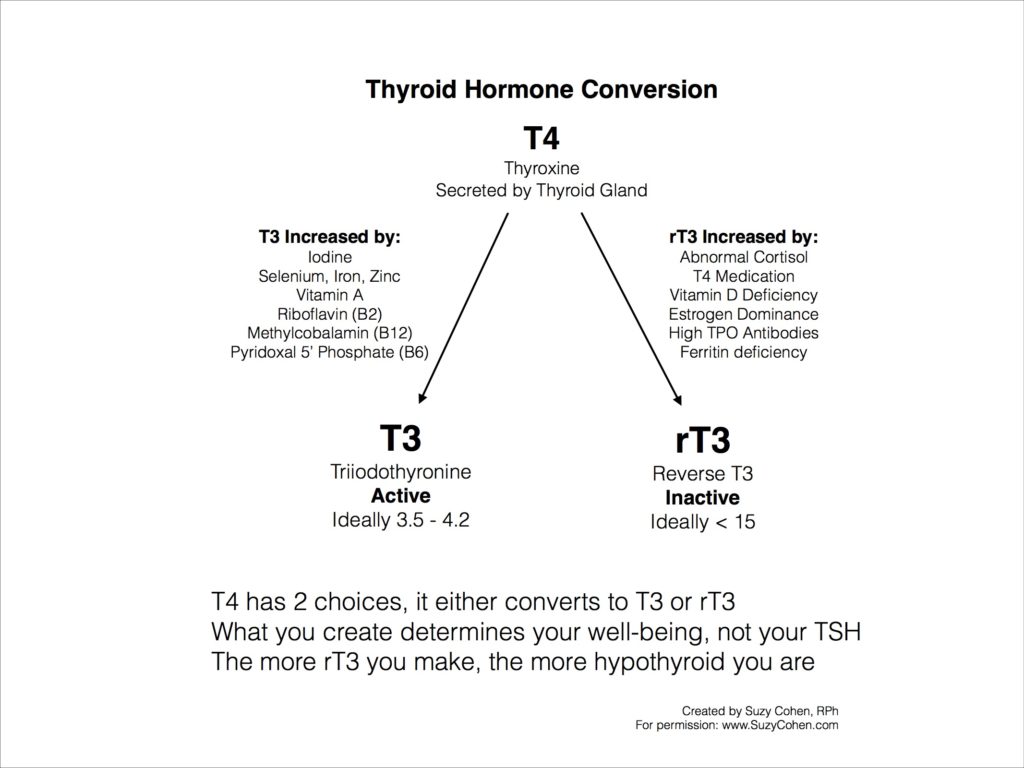
The fact is levothyroxine (T4) is currently the second most filled commonly prescription at pharmacies across America! And as you can see from my graphic above, it might just go in and out of you as T4 without ever converting to T3.
Thyroid disease is epidemic and not properly treated. It is tied to many emotional problems if left untreated. Levothyroxine has to be converted from inactive T4 to T3 in order to work. If it’s converted to rT3, it doesn’t work. Many people can’t do this conversion. To learn more about that, CLICK HERE to read my article, Measure Reverse T3 and Get Thyroid Healthy.
There’s a connection between mood and thyroid.
Some of you who are hanging on by a thread with severe or suicidal depression will find solace in the fact that a simple, inexpensive thyroid medication (or supplement) could turn things around for you. Many times depression’s underlying cause is undiagnosed hypothyroidism.
You cannot trust your lab tests. The reference ranges were decided upon based on a sick population. If you are in the “normal” reference range, that’s not saying a whole lot. I cover this in my Amazon best-seller, Thyroid Healthy: Lose Weight, Look Beautiful and Live the Life You Imagine. You can also shop with me if you’d like a copy of that by CLICKING HERE.
Facts About Depression
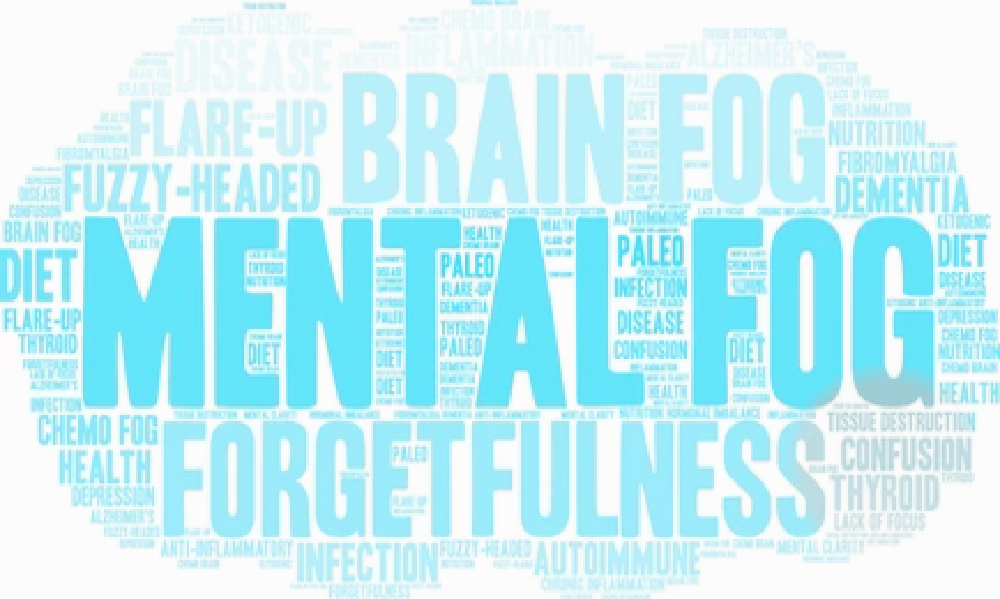
The major depressive disorder affects approximately 14.8 million American adults, which is almost 7 percent of the US population. By the time it takes you to read the next paragraph below, someone else will have taken their own life. That’s because every 40 seconds someone commits suicide in the world, and completes it.
I make that distinction about completion because, for every one person who dies, 11 more people attempt to kill themselves (though unsuccessfully), and wind up at the Emergency Room for the treatment of self-inflicted harm.
Over a million people die every single year because they choose to, and the thought of dying seems better than living with their anguish. I’d like to prevent some of those suicides today, by shining a flashlight into an area that’s not been tapped.
Depression ranks among the top 3 workplace issues so keep an eye on your co-workers, check in with those you sense need help, and offer to assist them somehow, just so they know someone in this world cares about them.
If you associate depression as a problem that impacts older people like people who recall the sound of a typewriter click, the ringing of a telephone or disco… well, you’re wrong. It affects children, adolescents and adults of any age. In fact, one in 33 children and 1 in 8 adolescents (age range 10 – 19), have a diagnosis of clinical depression. These stats are based on older surveys, new ones have yet to be complete. I am sure if the surveys were conducted in 2018, the numbers would be dramatically higher. And further, that’s just “depression” it’s not accounting for other mental and neurological disorders.
Now, Thyroid Disease.
There’s a connection to depression. Take a moment to find paper and write down the names of 7 women that you know, and put your own name down. That’s 8 names you’ve written down. At least 1 in 8 women will develop a thyroid disease in her lifetime. It’s THAT common!
Up to 60 percent of people with thyroid disease are 100% completely unaware of their condition, they assume they have some other condition that their physician has diagnosed them with, perhaps stress, high cholesterol, diabetes, bipolar, depression, anxiety, OCD, obesity, chronic fatigue syndrome, fibromyalgia or some other chronic illness or infection.
Our Troops Have Thyroid Disease.
It’s obvious that thyroid illness is one of the most prevalent disorders in the US because the medication standardly used to treat it is the second most prescribed medication. According to a report from The Medical Surveillance Monthly Report (MSMR), a peer-reviewed journal from the Armed Forces Health Surveillance, the most common illness was hypothyroidism over a 10-year surveillance period. Millions and millions of people are impacted by this problem, even the military! And remember, this condition -when untreated- causes weight gain, fatigue, depression, anxiety, brain fog, slowed thinking, and much more.
Eating iodized salt doesn’t repair your thyroid gland. This is one of the most common myths I’ve ever encountered. People say it all the time, “I eat iodized salt, so I’m fine.” Iodine is critical for reproductive health. Iodine is especially important for your breasts and prostate. If you have a disorder with your breasts or prostate, the first thing you should do is check your levels of iodine, again salt is not enough.
While iodine is needed and essential for your thyroid and proper thyroid hormone production, it does not prevent hypothyroidism of Hashimoto’s. Take a moment to read my article, Why Salt is Not Enough.
Cell Phones and Suicide Data
Depression is actually impacting younger and younger people, and many factors might be causing that, among them the toxins in our environment, pharmaceuticals via the drug mugging effect, phthalates, plasticizers, pesticides, perfumes which are potent endocrine disruptors, cell phones and nutritionally-naked foods.
A recent study links anxiety, severe depression, and suicide (and attempts) to smartphones and other mobile devices. Many people don’t even think mobile devices are anything to worry about, but they are if they’re always turned on. Teenagers might be particularly susceptible. They are constantly online checking Twitter, Instagram, Snapchat and Facebook. Some of them never stop texting, not even when they drive!
The study found a correlation between the rise of smartphone use and rates of the psychiatric problems above. The CDC substantiates this and their teen surveys found that hopelessness and suicidal ideation rose by 12% in just 5 years (from 2010 to 2015).
And at an impressionable age, it’s difficult because they become hypersensitive to everything posted, and whether it’s been liked or shared, while simultaneously retreating from real relationships where you have to talk and interact with a person… creating more and more social withdrawal, and then doctors give these kids drugs to help them integrate with society. In some cases, it’s a real mess to untangle!
People who spent 5 or more hours a day on their phone or laptop had thought about, planned, or attempted suicide at least one time compared to those who were on a device for less than an hour per day.
Am I blaming mobile devices for depression?
No, of course not. I was simply showing you that simple things we don’t even think about contribute to a person’s mood and might impact their mental health over time, especially when combined with other factors. Let’s talk about those.
For example, spraying on endocrine-disrupting perfumes, eating junk food or chemical-laden fast food twice a week, taking medications… (for example oral contraceptives which are drug muggers of folate, selenium and B12 needed to produce endorphins and “happy” neurotransmitters), and drinking from plastic water bottles… well… before you know it, these chemicals have sucked all your happy brain chemicals out, and now your mood is down the drain. There’s no reason you think… “Why do I feel this bad?”
But there really might be a reason, if you do a deep dive into your lifestyle, eating habits, and chemical exposures. Spraying your home with pesticides every month has an impact, as does any medication you take. I wasn’t picking on “The Pill.” Any drug that steals folate, vitamin C, selenium, B12, and B6 has the potential to cause both thyroid disease and depression. If you would like to know if you take a drug that depletes these, CLICK HERE to go to Amazon, so you can refer to my book, Drug Muggers: Which Medications are Robbing Your Body of Essential Nutrients and Natural Ways to Restore Them.
Many factors contribute to hypothyroidism and depression, and sometimes at the same time, impact weight, mood, and personality.
In come to the drugs, and years of psychotherapy, no one else has told you what I am telling you which is that these little factors have a cumulative, and harmful effect on the neurotransmitters responsible for sleep, relaxation, and passion, as well as a harmful effect on your thyroid.
I want to give you hope, not upset you.
The aim of my article today is to help you, not to take away your cheeseburgers or Chanel Coco, it’s not to make you give up your cell phone (but you could put it down for a few hours). Don’t get me started on the fake milks either, I disagree with them because they are laden with all kinds of chemicals and they’re high in glutamate (produces anxiety).
Hey, I’m not trying to take away life’s little luxuries or conveniences either. But you do need to do something, while you’re young and things can be turned around. Here’s why: Prescription antidepressants will either wear out, or you’ll come to need higher and higher doses (which could be toxic), and you’ll likely need different medications to either embellish the antidepressant that is starting to fail, or to offset the side effects produced by them.
Keep in mind that with antidepressant therapy, your precious neurotransmitters aren’t synthesized at a faster rate, and production of these happy chemicals does not go up; the drugs simply make the neurotransmitters that you have work a few minutes longer. Pretty soon, you might feel bad again.
And I’m worried about that.
And that’s why thyroid medication and/or supplements help so much. They actually can help long-term without tiring out, they cause you to produce more of your own hormones and neurotransmitters, and they might help immediately, like on Day one or two, or the first week.
With antidepressants, if they work they often take weeks. Some of you don’t have weeks in you. So fast-acting help is needed.
Repeating myself, but worth it.
At the risk of sounding like a broken record: If you have depression, OCD or anxiety, then it is possible (I can’t possibly know for sure) that you probably have underlying thyroid disease and that you might benefit from a trial run of thyroid medication, either an NDT combination of T4/T3 or a pure T3, but not likely T4. Your labs may not substantiate what I just said, but the labs and the outdated reference ranges are almost always wrong.
Which medication is right for you?
There isn’t one medication that is right for every person. But again, pure T4 drugs don’t generally do the job because they require conversion in the body, and activation which is very hard to do for most people. I have more thoughts on the pros and cons of each medication class, as well as herbal remedies, and it’s covered in great detail in my book.
Since this topic truly deserves a very long, thoughtful response, please refer to my book for more answers:
Thyroid Healthy: Lose Weight, Look Beautiful and Live the Life You Imagine.
This next part is very important, and it’s in my book, however you may not have a copy of that, so I want to at least confirm this with you right now: There is a lack of data on the improvement of depressive symptoms with levothyroxine therapy among individuals with coexistent thyroid disease.
In other words, if your doctor agrees to try you out on some thyroid medication because he/she agrees with my article (and the supporting research)… and you have a depressive disorder… levothyroxine is not what he/she should prescribe right off the bat, it has poor conversion of T4 to T3.
(Refer to my picture above showing conversion obstacles).
Depression appears to respond more so to medications that contain biologically active triiodothyronine or T3. Pure T3 drugs (ie Liothyronine, Cytomel or Compounded T3) as well as those NDT drugs that include T3 as part of their ingredients, definitely seem to work better as thyroid replacements, in particular for depression and other emotional disorders.
So, is thyroid medication better than antidepressants?
Yes, I believe so.
Several impressive trials including The STAR*D Trial have shown this.
Thyroid medication has the capacity to outperform conventional antidepressants used for depression. This might be because depression is not usually due to a reduction in serotonin, but rather a reduction in thyroid hormone production or utilization.
It’s shocking to hear that for some of you because for years, the commercials, psychiatrists and doctors all tried to UP your serotonin, but again, I hold to this: Depression is frequently tied to hypothyroidism, not serotonin deficiency. And the SSRIs don’t raise thyroid.
CAUTION: Do NOT stop any SSRIs, they could produce seizures and dangerous withdrawal effects. My point is this category of medications does not increase thyroid hormone levels, which is what your goal should be if you have depression. Most importantly, you can likely take a thyroid medication along with a prescription antidepressant, as your doctor.
It’s not either/or it could be both.
Translation = it’s not either an antidepressant or thyroid medicine.
It could be both.
Before leaving the topic of mood stabilization, I would be remiss if I did not mention lithium orotate. This is a natural, over-the-counter mineral that is a strong mood stabilizer, and it can naturally raise serotonin levels, as well as the thyroid. The dose varies, these are sold as 5mg capsules at any health food store.
Lithium and other thyroid-supportive dietary supplements can sometimes be used with medications, but you must ask your physician to be sure. Lithium was studied in the STAR*D trial as well as thyroid hormone.
It is an option for people who feel suicidally depressed, or have bipolar. Talk to your psychiatrist before doing anything because I am not responsible for your self-treatment, and I’m not advising it.
I’m giving you information, like other health bloggers so you can go to your physician or psychiatrist and pose some important questions about your personal health regimen based upon research. Do due diligence and research lithium orotate, thyroid vitamins and supplements as well as Fish Oils. All of these are known to stabilize and boost mood according to literature, and boost effectiveness of antidepressant medications.
The B vitamins are worth honorable mention! They are considered the anti-stress vitamins and you know them individually as folate, thiamine, pyridoxine, niacin and others. Sold as “B Complex” these might be able to help offset stress by improving conversion of key neurotransmitters that help with mood and cognition.* You can buy B Complex at any health food store, and online, and also look into my own custom methylated brand called Mito B Complex. With any health supplement, even over-the-counter ones, it’s ideal to ask a practitioner if it’s right for you.

Suzy Cohen, has been a licensed pharmacist for over 30 years and believes the best approach to chronic illness is a combination of natural medicine and conventional. She founded her own dietary supplement company specializing in custom-formulas, some of which have patents. With a special focus on functional medicine, thyroid health and drug nutrient depletion, Suzy is the author of several related books including Thyroid Healthy, Drug Muggers, Diabetes Without Drugs, and a nationally syndicated column.
